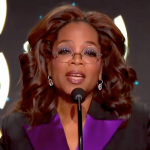Ten years ago, the two-part play Angels in America galvanized theatergoers with its shattering portrayal of the mid-’80s AIDS crisis and a Reaganized America in full-blown denial. The New Yorker called it “a victory for theater.” It won seven Tony Awards and a 1993 Pulitzer Prize. While the play’s kaleidoscopic plot includes a pill-popping Mormon and her closet-case husband, historical figures Roy Cohn and Ethel Rosenberg, and two British ghosts, its spiritual heart is an HIV positive New Yorker named Prior Walter, who begins to have visions of a terrifying angel after his HIV negative lover, Louis, abandons him. This month’s smashing six-hour HBO adaptation (part one, “Millennium Approaches,” Dec. 7, 8 p.m.; part two, “Perestroika,” Dec. 14, 8 p.m.), starring Al Pacino, Meryl Streep and Emma Thompson, channels the fiery ACT UP spirit that animated the play—but also shows Angels’ age (would you go on an AZT-only regimen?). I was excited to catch up with Kushner, partly to get him on the hotseat and partly because we have a history; back in the ’70s, I was the theater editor of Columbia University’s Daily Spectator and wisely assigned him a few stories (I can spot talent).
Musto: Hi, Tony. Congratulations on the long-awaited adaptation.
Kushner: I’m very happy with it.
Musto: Did you feel any trepidation about having a TV version done of your play?
Kushner: Trepidation doesn’t even begin to describe it. I was terrified. I’m still terrified. It’s an important play for me and I was afraid to see what it would do in another medium. Going back to it and being immersed in it again has been complicated.
Musto: But your screenplay adaptation is extremely faithful to the original, which helps preserve the theatricality of it all.
Kushner: There are a few scenes that are new and a few things that are gone, but I didn’t have to reinvent the wheel. [Angels’ director] Mike Nichols was so committed to the theatricality of things. The first thing he said was, “I want to do the doubling of characters” [actors playing multiple roles]. It never occurred to me that you could get away with doing that in film. I thought, “This is daring!”
Musto: One thing that is missing is the line outing former New York City mayor Ed Koch, an arch-enemy of AIDS activists, as gay.
Kushner: I don’t know if that was gone in the screenplay or taken out in editing. Maybe the [filmmakers] figured no one knows who Ed is anymore, which would be a lovely thing to believe. Oblivion is what Ed deserves. When the play was on Broadway, a New York name lawyer who’s a friend of Koch’s asked me if I’d please take the line out because it was really hurting Ed’s feelings. I left it in. It was mean to do, but I really hated him. He’s such a ghastly man and such a betrayer of the progressive vision he rose to prominence on. He became such a reactionary blimp.
Musto: But tell me what you really think. Back to the trepidation: How did you feel about all the Oscar winners, like Al Pacino, Meryl Streep and Emma Thompson, sprinkling their celebrity on the HBO version? Were you afraid the star power might overshadow your work?
Kushner: There was something surreal about saying, “I’m looking at Al Pacino saying words I wrote.” I don’t want be too golly-gee, but it’s strange to me. It’s not my world at all. I don’t have any aspirations of making it my world. If it had been Mel Gibson, I wouldn’t have been so happy. But Al Pacino is amazing, Meryl is God, and Emma is brilliant. It’s not easy material and it was a nine- or 10-month shoot. The scene where Joe [the sexually conflicted Mormon played by Patrick Wilson] calls his mother from Central Park had to be shot at 4 a.m. because Patrick was doing Oklahoma! on Broadway at the time. They offered Meryl the option of tape-recording her responses to his questions separately. She insisted they wake her up and call her at home. She stayed on the phone with him through the entire filming of the scene.
Musto: That’s my Meryl. Apropos of reactionary blimps, when you wrote the play, why did you pick Roy Cohn as the iconic example of manipulative evil and denial?
Kushner: I’ve been obsessed with him since I was 10. There was something sexy to me about him, even though the guy was a complete monster. In ways, I identified—he was gay and a Jew. When he died, it was a very dark moment in the early years of the epidemic. There was an ugly obituary in The Nation saying there’s always been a connection between homosexuality and fascism, and Roy Cohn was one of those people. I was enraged on Roy’s behalf, which was a feeling I wasn’t used to. I thought, “There’s something really rich here.” And I was moved that he never backed down about McCarthy. He never said, “I was wrong.” I found that consistency interesting.
Musto: In today’s still-gay-baiting and AIDS-hypocritical Republican era, your play seems more relevant than ever. On the other hand, it screams period-piece. The face of AIDS has changed. These days, the headlines are all about Africa.
Kushner: Obviously it’s a hugely new landscape due to the demographics of the disease. The period I wrote the play about, AIDS was still primarily a disease of gay men in this country. By the time the play was on Broadway, it was becoming more a problem for women and much more for people of color. It was always in Africa, but we didn’t care as much about it. In some ways, [even if AIDS] feels more in control domestically, if you look at statistics in India and China, it feels like the end of the world. It’s like seeing a tsunami gathering force in the ocean and heading right toward you. When you consider all the orphans who’ve lost both parents, you’re talking about consequences for hundreds of years to come. And the completely disgusting way [President] Bush has manipulated this—“We’re giving five billion, wait it’s one billion...” Tens of billions are needed and it’s insane that we’re not spending it.
Musto: The other major thing that’s changed is that in Angels, AIDS seems like an almost-certain death sentence—there’s been so much forward motion medically.
Kushner: When I wrote Angels, no one had ever heard of AZT, but by the time it was on Broadway, AZT was seen as a very mixed bag. It ended that period where you got sick and just died. But it clearly decimated a human body [because it was given at too high a dose] and turned out not to be anything that we thought at the time.
Musto: In the screening I went to, people snorted when they saw Belize [Prior’s caring soothsayer nurse, played by Jeffrey Wright] giving the AZT he steals from Roy Cohn to Prior, insisting it will save him. Since AZT was prescribed at toxic doses back in the ’80s, was Belize’s gift such a nice gesture, after all?
Kushner: Looking back historically, it’s heartbreaking. There’s this struggle in the play for this poison. [But] it is nice. It’s all there is and it’s so much better than nothing. When the epidemic happened, as we remember because we were there, it transformed our community’s sense of what it was about and what it was aiming for. We had to do this difficult thing no community in history’s had to do—in the middle of a struggle for liberation, we were confronted with biological calamity. We had to refuse the negative meaning assigned to us by the Right—that this is payback for violating the laws of nature or god and we should recognize the evil of homosexuality. [The community] said, “We reject this. We’re going to continue the struggle we’ve been engaged in and take the devastation and transform it into a powerful political force.” That’s what ACT UP was. As a consequence, we’ve called into question the relationship between doctors and patients and we’ve raised a lot of incredibly critical questions about health care. The struggle isn’t over, but we’ve traveled a long distance and done some world-changing things. The world will never change back. That’s to our eternal credit.
Musto: But in light of the global pandemic, does Angels’ ending—with Prior beaming about advances that will surely be made in the wake of the devastation—now seem a little too optimistic?
Kushner: No, because of what I’m saying. In the middle of this hideous, illegitimate, criminal administration and this toxic environment nationally in terms of the dangerous, crazed House of Representatives and the ineffectual, split-down-the-middle Senate, you have the Supreme Court overturning sodomy, and Massachusetts hopefully on the brink of putting a judicial stamp on gay marriage, and Canada having done it. What Prior says is true—we’re going to be citizens. I took a lot of shit from the radical left when the play came out, that citizenship was something worth aspiring to, that it seemed banal and short-sighted. But I believe that in a democracy, citizenship is one of the great goals, an accomplishment of a human civilization. The aspiration toward that has always been transformative of society in general. And we’re on our way.







Comments
Comments